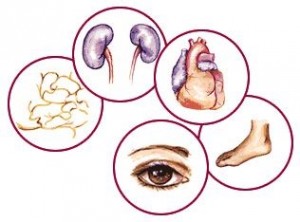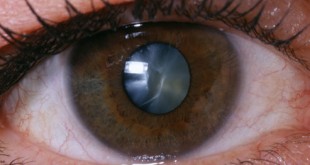Ophthalmologists play an important role in preventing the complications of late-stage eye disease caused by diabetes. By routinely measuring blood pressure in all adult patients and providing education on healthy lifestyles, eye-care providers can contribute to early diagnosis, improved prognosis, and prevention of the complications of late-stage eye disease caused by diabetes.
Diabetes can lead to multi-organ complications including damage to large and small blood vessels causing heart attack, stroke and problems with the kidneys, eyes, teeth, feet and nerves. However, the risk of most diabetes-related complications can be reduced.
Diagram 1: Multi-organ involvement in diabetes-related complication
Duration of diabetes is a major risk-factor associated with the development of diabetic retinopathy or any eye-related diabetic complication. The risk is higher and increasing when the patient has longer duration of diabetes mellitus.
Small differences in systemic risk-factors can lead to large differences in ocular complications. For instance, each 1% reduction in HbA1c reduces the risk of retinopathy development or progression by 40%.
The most effective way to treat diabetic retinopathy is to prevent it from developing in the first place. However, we need cooperation from patient as well as the physician to optimize the diabetes care before eye complications worsen.
Eye damage and diabetes – how to reduce the risk?
Damage to the blood vessels at the back of the eyes (retinopathy) can occur without us being aware of it. Our vision may seem unchanged until the problem is severe. However, retinopathy can be detected in the early stages by having our eyes checked regularly, and action can be taken to prevent further damage.
Diagram 2: Diabetic eye complications
To reduce the risk of eye damage:
- Have regular eye checks – diabetic patients should have a professional eye examination by an ophthalmologist or optometrist when they are first diagnosed and then at least yearly after that depending on the severity of the retinopathy (children usually start this screening at puberty). If retinopathy or other abnormality is found, regular follow-up and appropriate treatment will be given to prevent progression.
- Manage your health – keep blood glucose levels, HbA1c and blood pressure within the recommended range. This is also to prevent other end organ damage such as heart failure, stroke as well as kidney diseases.
- Seek help quickly – if you notice any changes in your vision, notify your doctor or eye specialist immediately. Sudden loss of vision can be due to early sign for major stroke or cardiac event. Treatment should be started immediately to prevent permanent visual loss as well as other life-threatening conditions.
Reference:
Diagram 1: healthkp.com
Diagram 2 : fastbleep.com
 PENDIDIKAN PESAKIT Kementerian Kesihatan Malaysia
PENDIDIKAN PESAKIT Kementerian Kesihatan Malaysia





